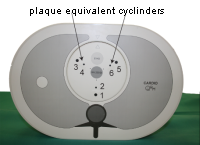Calcium Scoring
With ACCURATUM, we have developed a method that is more accurate than classical calcium scoring and is less dependent on tube voltage, reconstruction kernel, and plaque density. ACCURATUM uses a mesh-based approach to overcome the voxel volume as a discrete unit. Furthermore, the exact boundary transition between plaque and surrounding tissue is determined by a deconvolution approach.
ACCURATUM was evaluated and compared with the classical volume scoring method for accuracy, i.e., the normalized volume (measured volume/ ground-truthed volume), and for variability between examinations (standard deviation of accuracy). A cardiac computed-tomography (CT) phantom containing various cylindrical calcifications was scanned using different tube voltages and reconstruction kernels, at various positions and orientations on the CT table and using different slice thicknesses.
Mean accuracy for all plaques was significantly higher (p<0.0001) for the proposed method (1.220±0.507) than for the classical volume score (1.896±1.095). In contrast to the classical volume score, plaque density (p=0.84), reconstruction kernel (p=0.19), and tube voltage (p=0.27) had no impact on the accuracy of the developed method.

